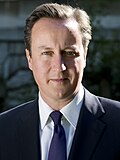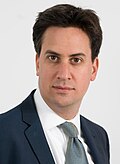Early proposals and arrangements
On 9 May 2014—almost exactly a year before the election date—David Cameron proposed a five-way debate, with the leaders of "all the main parties". This would be followed up by a separate "head to head" debate between himself and Labour's Ed Miliband. This itself was an adjustment from an earlier proposal of Cameron for three debates. [28]
During October that year, all four main broadcasters, the BBC, ITV, Channel 4 and Sky announced joint plans for multi-platform party leader debates in the run up to the 2015 general election. Three debates would have taken place within the six-week campaign period, at a time when the parties were to be setting out their policies, to help further engage the audience with the election. The proposal entailed debates at fortnightly intervals on 2 April, 16 April and 30 April at locations around the UK. [29] [30]
- The First Debate was to be a "head to head" debate between David Cameron and Ed Miliband.
- The Second Debate was to follow the pattern of the 2010 debates, between the Conservative, Labour and Liberal Democrat leaders.
- The third Debate would have had the Conservative, Labour, Liberal Democrat and UKIP leaders.
In January 2015, ITV and the BBC published revised plans for the television election debates to include seven main UK political parties' leaders. [31] The revised proposals would see the debates being held on Thursdays: 2, 16, and 30 April 2015, during the general election campaign.
The proposals issued were for:
- Two seven-way debates including representatives of the Conservative Party, Labour, Liberal Democrats, UKIP, Greens, SNP and Plaid Cymru one hosted by BBC, and the other by ITV.
- A debate that would be 'head-to-head' between David Cameron and Ed Miliband, jointly hosted by Channel 4 and Sky. [32]
Warnings were given from all the broadcasters that if the leaders failed to turn up an 'empty chair' would be used instead. [33]
On 23 February 2015, the broadcasters agreed on three debates: [34] [35]
- 2 April: ITV - Debate between the party leaders of the Conservatives, Labour, Liberal Democrats, UKIP, the SNP, the Green Party and Plaid Cymru.
- 16 April: BBC - A second debate between the seven party leaders above.
- 30 April: Sky and Channel 4 - Head-to-head debate between the Leader of the Conservative Party and the Leader of the Labour Party.
March 2015
On 4 March 2015 David Cameron stated, in what was described as a "final offer", [36] that he would only participate in a single debate, involving the leaders of the Conservatives, Labour, the Liberal Democrats, UKIP, the SNP, the Green Party, Plaid Cymru and possibly the Democratic Unionist Party (DUP). He also said that the debate must occur before the start of the short campaign, i.e. before 30 March 2015. [37] His announcement effectively ruled out the proposed one on one debate between Ed Miliband and the Prime Minister, and raised the prospect of Cameron being "empty chaired" in debates involving other party leaders but not him. [38] [39] On 6 March, the broadcasters confirmed that they intended to go ahead with all three debates. [2] [40] In response to the possibility of Cameron being "empty chaired", Ofcom warned that broadcasters had to be careful about impartiality rules. [41]
The Telegraph and The Guardian , in association with Google and YouTube, then announced that they intended to hold an internet-broadcast live debate, which was planned to feature David Cameron, Ed Miliband, Nick Clegg, Nigel Farage, and Natalie Bennett, and had issued an invitation to the five party leaders. The debate was to be held on 26 or 27 March (before the short campaign, as favoured by the Conservatives). The Liberal Democrats nominally expressed their intention to participate; however there was concern that the absence of the SNP might prove to be an obstacle. [42] [43] UKIP categorically agreed to participate. [43] Conservative chairman Grant Shapps expressed that he was in favour. [43] However, without any formal agreement forthcoming, the organisers wrote to David Cameron on 17 March asking for his commitment. [3] The debate did not take place.
That day, the Conservatives accepted the offer of a single, 7-way debate to be broadcast on ITV on 2 April, [3] [41] with the other two planned debates cancelled. [44] According to the Conservatives, they were approached with a new 4-programme plan, [44] which was reported to be:
- 26 March on Sky/Channel 4: Leaders' interviews with Cameron and Miliband interviewed sequentially by Jeremy Paxman, with studio audience.
- 2 April on ITV: Debate with the leaders of the Conservatives, Labour, Liberal Democrats, UKIP, Greens, SNP, Plaid Cymru and DUP. [45]
- 16 April: Debate with the "challenger parties", i.e. SNP, UKIP, Plaid Cymru, Greens and DUP. [45]
- 30 April on BBC: Question Time with Cameron, Miliband and Clegg taking questions from audience sequentially.
The Liberal Democrats accepted these proposals, but Nick Clegg has said he still hoped for a four-way leaders debate involving the Conservatives, Labour, Liberal Democrats and UKIP (as the four main parties as defined by Ofcom). [45] However, Labour and UKIP responded that they are only aware of the prior proposal from the broadcasters for three debates, which they still supported. [36] [44] The SNP, likewise, called on Cameron to take part in the three debates previously proposed. [44] Commentators argued that the new proposed format would be better for the Conservatives than having three debates including a head-to-head with Miliband. [46] [47]
Negotiations continued, with the broadcasters offering to include Labour in the 16 April debate. [48] A final settlement was reached on 21 March. The agreed schedule was only a slight modification of the 17 March proposal, with the "challenger party" debates now featuring Ed Miliband instead of a representative from the DUP, with resistance from the DUP. [49] The final plan was thus:
- 26 March on Sky/Channel 4: Leaders' interviews, with Cameron and Miliband interviewed sequentially by Paxman, with a studio audience. [50]
- 2 April on ITV: Debate with the leaders of the Conservatives, Labour, Liberal Democrats, UKIP, Greens, SNP and Plaid Cymru chaired by Julie Etchingham. [49]
- 16 April on BBC: Debate with the "challenger parties", i.e. Labour, UKIP, SNP, Plaid Cymru and Greens, chaired by David Dimbleby. [49]
- 30 April on BBC: Question Time with Cameron, Miliband and Clegg taking questions from the audience sequentially, chaired by Dimbleby.

















